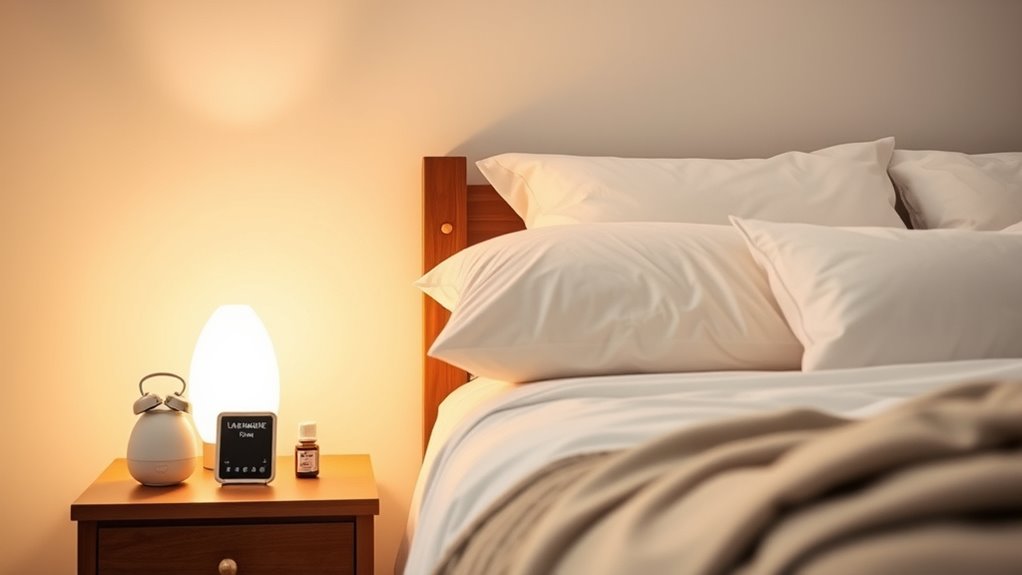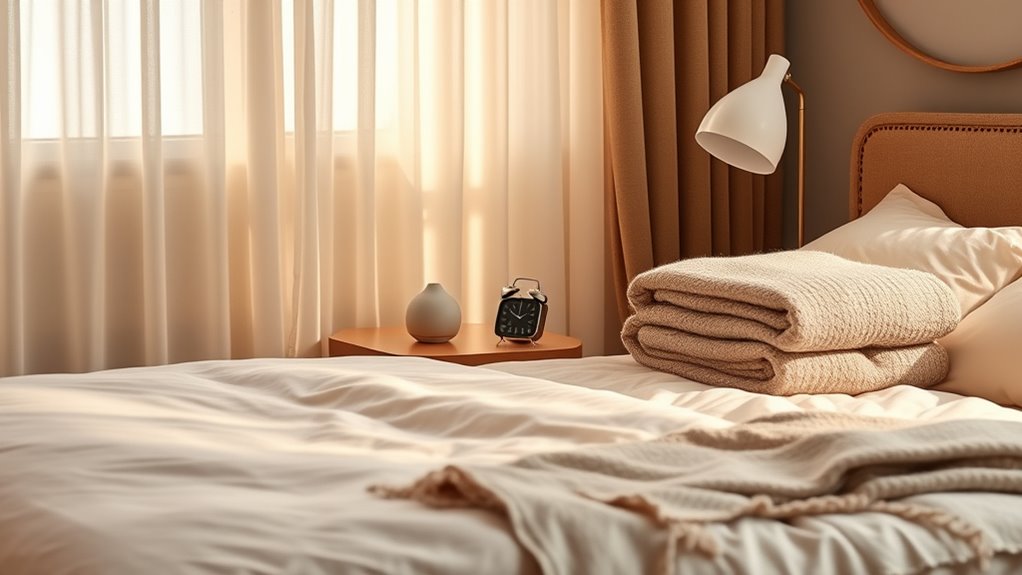Improving your sleep hygiene can make a big difference with simple tweaks. Create a cool, dark, and quiet bedroom, and avoid screens before bed to boost melatonin and promote better sleep. Use calming scents like lavender and invest in a comfortable mattress to enhance physical comfort. Maintaining a consistent sleep schedule helps your body settle into restful REM cycles. Keep exploring these small changes to discover more restful nights and vivid dreams.
Key Takeaways
- Create a cool, dark, and quiet bedroom with blackout curtains and white noise to improve sleep quality.
- Limit screen time before bed and engage in relaxing activities to enhance melatonin production.
- Maintain a consistent sleep schedule to regulate your circadian rhythm and promote vivid dreams.
- Use soothing scents like lavender and invest in comfortable bedding to foster relaxation and physical comfort.
- Keep your sleeping environment clutter-free and at an ideal temperature (60-67°F) for deeper, more restorative sleep.

Getting a good night’s sleep starts with practicing proper sleep hygiene. One of the most effective ways to improve your sleep quality is by paying attention to your sleep environment, which plays a significant role in dream enhancement and overall restfulness. When your bedroom is optimized for sleep, you’re more likely to fall asleep faster, stay asleep longer, and experience more vivid, memorable dreams. Start by creating a space that’s cool, dark, and quiet. Darkness signals to your body that it’s time to rest, so consider blackout curtains or an eye mask. Noise can disrupt your sleep cycles, so if you’re sensitive to sound, use earplugs or a white noise machine. Maintaining a comfortable temperature—usually between 60-67°F (15-19°C)—also helps your body relax and prepares it for restorative sleep.
Your sleep environment doesn’t just influence how well you sleep; it can also enhance your dreams. A calm, clutter-free space promotes deeper rest, which is linked to more intense and memorable dreaming. When your mind feels safe and relaxed, your brain can enter REM sleep more easily, the stage associated with vivid dreams. Think about incorporating soothing scents like lavender or chamomile, which have been shown to promote relaxation and improve sleep quality. Additionally, investing in a comfortable mattress and pillows supports physical comfort, reducing disruptions that can fragment your sleep and interfere with dream cycles.
Establishing a consistent sleep environment also involves limiting exposure to screens before bed. The blue light emitted by phones, tablets, and computers suppresses melatonin, the hormone that helps regulate your sleep-wake cycle. Instead of scrolling through your devices, try winding down with relaxing activities like reading a book or practicing gentle stretches. Keeping a regular sleep schedule reinforces your body’s internal clock, making it easier to fall asleep and enter REM sleep, where dreams are most vivid. As your sleep environment becomes a sanctuary for rest, you’ll likely notice improvements not only in how well you sleep but also in the richness and clarity of your dreams.
Small changes to your sleep environment can lead to significant benefits. By prioritizing a dark, quiet, and comfortable space, you create the ideal conditions for restorative sleep and dream enhancement. Over time, these adjustments help your body associate your bedroom with relaxation and sleep, making it easier to drift off and enjoy the benefits of high-quality rest. Remember, your sleep environment sets the foundation for the quality of your sleep and dreams, so take the time to optimize it and watch your sleep quality improve dramatically.
Frequently Asked Questions
How Long Does It Take to See Improvements From Sleep Hygiene Changes?
You might start noticing improvements in your sleep cycle within a few days to a week after adopting better sleep hygiene. Consistent bedtime routines help regulate your body’s internal clock, leading to more restful sleep. Keep track of your progress, and if you stick to your new habits, you’ll likely see better sleep quality and fewer nighttime awakenings within this timeframe. Patience and consistency make a big difference.
Can Sleep Hygiene Practices Help With Chronic Insomnia?
Sure, sleep hygiene practices can help with chronic insomnia—who knew a better bedtime routine and a cozy sleep environment could do so much? Ironically, the more you resist tossing and turning, the more these small changes can improve your sleep. Consistently sticking to a calming bedtime routine and optimizing your sleep environment signals your body it’s time to rest, gradually easing chronic insomnia’s grip.
Are Sleep Hygiene Tips Effective for Shift Workers?
Yes, sleep hygiene tips can be effective for shift workers. You can tackle shift work challenges by optimizing your sleep environment—darkening your room, reducing noise, and maintaining a cool temperature. Stick to consistent sleep and wake times, even on days off, and avoid caffeine before bedtime. These small adjustments help improve your sleep quality, making it easier to rest despite irregular schedules.
How Does Sleep Hygiene Impact Mental Health?
Think of sleep hygiene as the foundation of your mental fortress; without it, vulnerabilities grow. Poor sleep deprivation chips away at your mental resilience, making stress harder to handle and mood swings more likely. When you prioritize good sleep habits, you strengthen your mind’s defenses, helping you stay sharper, calmer, and more balanced. Small changes in your sleep routine can have a powerful impact on maintaining mental health and resilience.
Can Poor Sleep Hygiene Cause Long-Term Health Issues?
Yes, poor sleep hygiene can cause long-term health issues. When you neglect good sleep habits, you increase your risk of developing sleep disorders like insomnia, which leads to chronic sleep problems. This can result in daytime fatigue, weakening your immune system, raising your risk for heart disease, and impacting mental health. Over time, these issues can profoundly diminish your overall quality of life. Prioritize sleep to protect your long-term health.
Conclusion
By adopting these simple sleep hygiene habits, you’re taking control of your nights like a modern-day Sisyphus, rolling away the boulders of fatigue and restless nights. Small changes can lead to a peaceful, restorative sleep that fuels your days. Remember, even Odysseus faced many obstacles, but with perseverance, he reached his home. Likewise, with patience and consistency, you’ll find your way to better sleep—and wake up ready to conquer whatever awaits.









